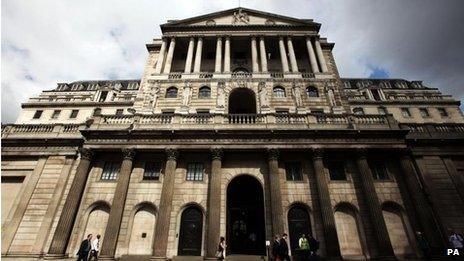Is a UK rate rise good or bad?
- Published
- comments

Welcome to the United Kingdom, home of monetary experiments.
After the crash of 2008, the UK was a pioneer in reducing interest rates to as close to zero as makes little difference, and was the first in the rich West to create hundreds of billions of pounds of new money through quantitative easing.
It now looks as though we may be the first to use so-called macro-prudential tools to curb an incipient housing bubble: it would be extraordinary if the the Bank of England's Financial Policy Committee did not in coming weeks force banks to ration the provision of higher risk mortgages or make it more expensive to provide mortgages (by increasing the capital banks have to hold for mortgages) or both.
And it would be equally odd if the Bank did not become the first of the important developed-country central banks to start increasing interest rates above the near zero that has prevailed since the onset of the Great Recession.
With the UK economy growing stronger than pretty much every other rich country, markets expect the Bank of England to raise its policy rate in the first quarter of next year.
That might be right.
But if the Bank's Monetary Policy Committee has half an eye on politics, or a desire not to be seen to be influencing the general election in any way, it might decide to start the rate rises in the autumn - because an increase in the cost of money just before next May's election might appear to be making mischief for the government, and a rise just after might be interpreted as having done it a favour.
The point is that UK rates will almost certainly rise before those in the US - where Fed chair Janet Yellen yesterday said little to suggest she is in any hurry to end the era of free money.
As for the eurozone, it is under pressure - from the OECD, for example - to cut its policy rate to nought and is currently considering embarking on the creation of new money (QE) for the first time.
In Japan too, with its economy looking limp again, there is a strong probability of a new central bank initiative to create money and reduce the cost of borrowing.
So of the developed economies laid low by those terrible events of sevenish years ago, the UK - perhaps surprisingly - will be the first (probably) to make a gentle return to more normal monetary conditions.
This will doubtless be something of a relief to the Fed and European Central Bank - because they will have the opportunity to observe how brilliantly (or otherwise) the Bank of England manages this modest monetary tightening.
Expectations of all this is already having an impact - in that those wanting a mortgage are being charged a little more to borrow, in anticipation of action by the Bank of England.
And sterling is strengthening. It has risen 12%, on a trade-weighted basis, since last March, and has been nudging the symbolic level of $1.70 in recent days.
So, in theory, our exporters will be finding it a bit tougher - and some of you may be thinking foreign looks a bit more attractive as a holiday destination.
As it happens, I am on my way to elegant soggy Bath for the day, to test the mood on all this on businesses and you.
Is it good or bad that the UK is likely to raise rates first?
Well perhaps it means that our economy is in more robust health than the others. Or it might mean, less charitably, that we are more prone to asset bubbles and excessive consumer spending than the rest.
That said, it must be better to have possible overheating and inflation as our challenge, rather than the slump and risk of deflation of recent times.